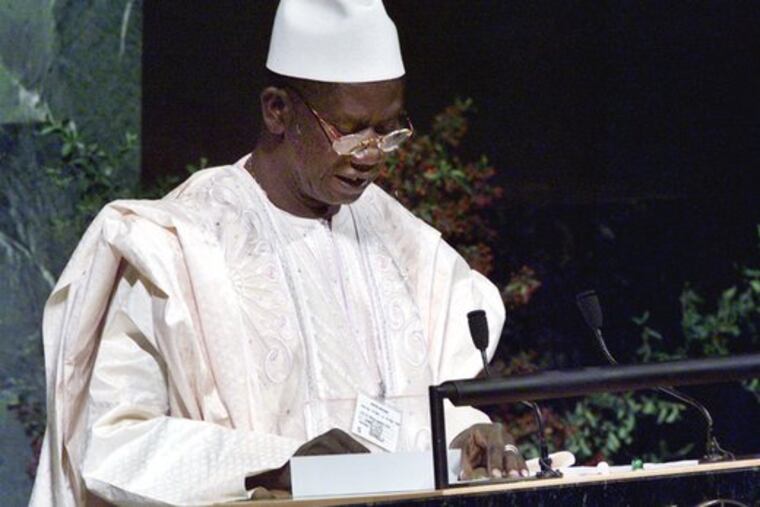Officers declare a coup in Guinea
After news of a longtime dictator's death, a group announced it was taking over. Troops and tanks were seen in the capital.

CONAKRY, Guinea - A military group seized control of the airwaves in mineral-rich Guinea and declared a coup yesterday after the death of the West African country's dictator, one of the continent's last strongmen.
The turmoil raises the prospect of violence flaring in a region where neighbors Sierra Leone, Ivory Coast and Liberia have all been devastated by years of war.
A group calling itself the National Council for Democracy began announcing its takeover on state-run radio and TV just hours after the Monday death of longtime dictator Lansana Conte was made public.
"The government is dissolved. The institutions of the republic are dissolved. . . . From this moment on, the council is taking charge of the destiny of the Guinean people," said the coup leader, who identified himself as Capt. Moussa Camara.
Dozens of armed soldiers were seen heading toward Prime Minister Ahmed Tidiane Souare's office inside Guinea's presidential compound. They appeared less than an hour after Souare announced in a state broadcast that he was inside his office and that his government had not been dissolved.
A reporter later saw two tanks parked near the compound and a third circulating through the capital. A fourth was parked at the headquarters of state-run radio and TV, where transmissions had been cut.
Guinea's Army Chief of Staff Gen. Diarra Camara said the motives of the coup leaders were unclear.
"I think they are in a minority," he told international news channel France 244. "They are not unanimously backed by the army for the time being. I don't know their real objectives."
The coup leader, in his announcement, said that presidential elections would be held within 60 days and that an interim president and prime minister would be appointed. Coup leaders were meeting late yesterday to decide who would head the interim government, said Aboubacar Sompare, president of the National Assembly.
The U.S. Embassy in Conakry said there had been no reports of fighting or casualties, "but the situation remains fluid and uncertain at this time."
White House deputy press secretary Tony Fratto said: "It's obviously a troubled region and with a history that hasn't always seen those kinds of smooth transitions of power. And so we're keeping an eye on it."
Conte, who was believed to be in his 70s, was only Guinea's second president since it gained independence from France a half-century ago. He was among the last of the so-called African Big Men who came to power by the gun and resisted the democratic tide sweeping the continent.
Guinea is the world's largest producer of bauxite, used to produce aluminum, and also has gold, diamonds and iron-ore deposits. The nation, located at the confluence of several rivers, could generate enough electricity to power the region, some analysts say.
But Guinea's economy has rapidly deteriorated, and its 10 million people are among the world's poorest.
While Guinea has managed to avoid the catastrophic wars that ravaged its West African neighbors, regional experts have warned for years that Conte's death or ouster could send it into turmoil.
Conte took power in a 1984 military coup after the death of his predecessor. His unpopularity grew in his final years as the economy deteriorated.
Sub-Saharan Strongmen
A look at long-serving sub-Saharan African leaders:
Angola:
Jose Eduardo dos Santos took power in the oil-producing nation of 12 million in 1979 after winning election under a one-party system.
Burkina Faso:
Blaise Compaore and Thomas Sankara led a 1983 coup. Compaore came to power after Sankara was assassinated in 1987.
Cameroon:
Paul Biya took over when Ahmadou Ahidjo, president since 1961, resigned in 1982.
Republic of Congo:
Denis Sassou-Nguesso ruled from 1979 until a 1992 election defeat, then seized power again in 1997 with help from Angolan troops.
Equatorial Guinea:
Teodoro Obiang seized power in the oil-rich nation in a 1979 coup. His government is considered among Africa's worst human-rights violators.
Gabon:
Omar Bongo rose to the presidency in 1967 after his predecessor died. Bongo faces little political opposition in the oil-rich nation of 1.5 million, ruling through a mixture of patronage and quiet intimidation.
Sudan:
Omar al-Bashir has led the country since a 1989 Islamist military coup.
Swaziland:
Africa's last absolute monarchy has been led by Mswati III since 1986. The country faces a growing pro-democracy movement.
Uganda:
Yoweri Museveni led an insurgency to take power in 1986. In recent years, he has been accused of quashing dissent and reversing presidential term limits.
Zimbabwe:
Robert Mugabe has been the only leader since independence from Britain in 1980. He is accused of bringing a once-prosperous nation to ruin, and is under domestic and global pressure to step down.
SOURCE: Associated Press